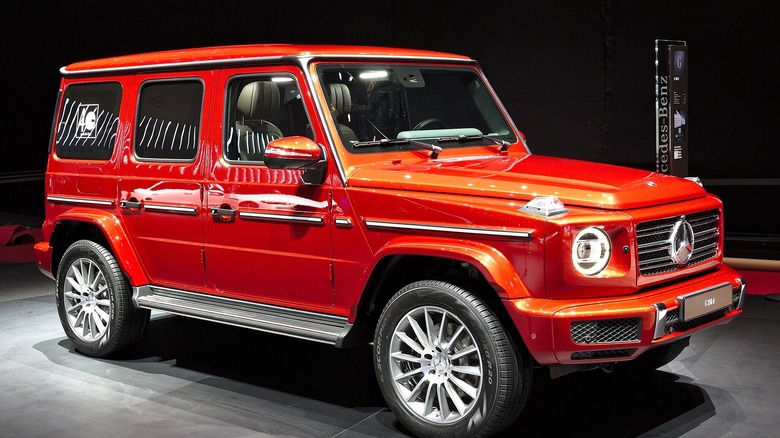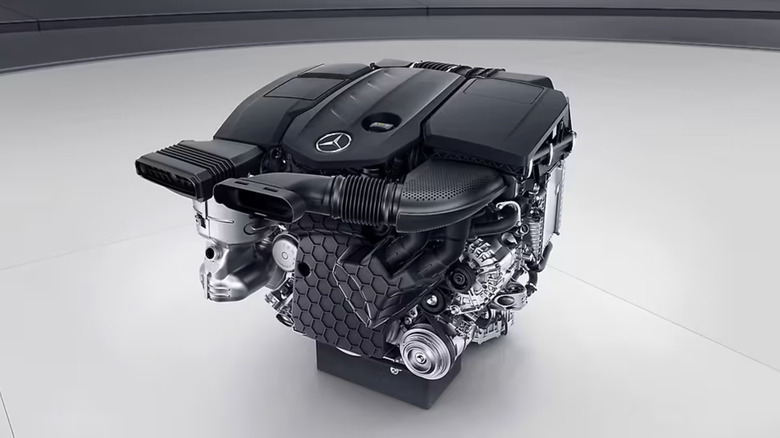Here's Why Mercedes-Benz Doesn't Sell Diesel Powered Cars In The U.S.
The three-pointed silver star symbol of Mercedes-Benz has come to represent luxury. Since the company began in 1901, it has manufactured vehicles from innovative electric-run sedans to ultra-expensive performance cars. Recently, the company has also begun to explore segments beyond high-end cars for big spenders. Its line of eSprinter commercial vans have expanded the range of possibility for EV technology, with sales up by 15% in the U.S. alone. While there may be plenty of Mercedes cars and vans for consumers to select from, in the U.S., the options are limited — at least when it comes to diesel-powered Mercedes models.
In a 2018 interview with The Detroit Bureau, Ola Kallenius, former Head of R&D, now Chairman of the Board of Management for Mercedes-Benz, affirmed that there was not a large enough consumer base to validate the shipment of diesel models to U.S. markets. Considering that in Q2 of 2024 only 3.8% of the total vehicles purchased in the U.S. were powered by diesel engines, the math does make a lot of sense. Yet while waning profits may have played an important factor in the decision, Mercedes' continued stance on the moratorium might have a little more to do with a combination of the country's increasingly more restrictive emissions regulations and the American public's general distrust of diesel products.
[Featured image by Alexander Migl via Wikimedia Commons | Cropped and scaled | CC BY-SA 4.0]
Mercedes-Benz paid a $1.5 billion settlement after accused of cheating U.S. emissions regulations
Earlier this year, the EPA proposed enhancements to its regulations, with the objective of accelerating the production and use of EV and hybrid cars to 56% by 2032 and reducing the proliferation of harmful greenhouse gases. The new regulations have set a NOx idling standard of 10 grams per hour for diesel engines, which will reduce further to 5 grams per hour by 2027. Many automakers have struggled to keep up and maintain the expectations set by the EPA, arguing that the technology and infrastructure for electric automobiles is still lacking.
Furthermore, American consumers have grown wary of diesel products since news broke in 2015 that Volkswagen had knowingly installed "defeat devices" — software that can manipulate results from emissions tests — in an estimated 11 million models that were sold. A year after the infamous "Dieselgate" scandal, Mercedes-Benz was accused of utilizing a similar form of technology to bypass reviews of its own diesel-run vehicles and subsequently investigated by the U.S. Department of Justice. Although the DOJ officially dropped its investigation in April 2024, finding no fault for the class action suit, Mercedes still had to pay a settlement of $1.5 billion to U.S. regulatory bureaus like the EPA and the California Air Resource Board ("CARB").
Due to the cost of complying with U.S. emissions regulations as well as lack of consumer trust and enthusiasm, it makes sense from a business standpoint that Mercedes-Benz would prefer halting further shipment of diesel models to forego any other potential hits to its bottom line. However, the German automaker has made an exception in the case of the eSprinter commercial van, which will continue to offer a diesel alternative available in the U.S.

